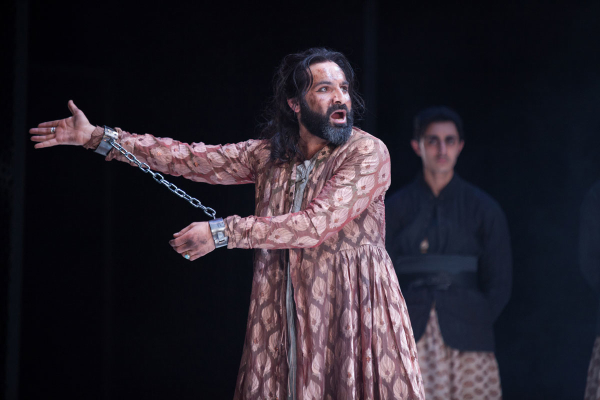Dara (National Theatre, Lyttelton)

© Ellie Kurttz
At Dara's core is a court scene – right up there with Galileo’s or Shylock’s. Dara, the rightful emperor of Mughal India, is on trial for apostasy, betraying his Muslim faith. He has, in fact, converted to Sufism, a form of Islam that concentrates on its essence over its particulars, and believes that all faiths – Hindusim and Sikhism – aim at and derive from the same truth. "The rest," he says, "is ritual".
The prosecution disagrees. The Islam recognised by Emperor Aurangzeb (Sargon Yelda), Dara’s younger brother, is exclusive and incontrovertible: to believe in Allah is to reject all other faiths.
Shahid Nadeem‘s play, an import from Pakistan’s Ajoka Theatre, cuts to the thrust of the most critical, insoluble dilemma of our times; faith’s absolutism against liberalism’s tolerance. It’s there in the rise of ISIS and in the Charlie Hebdo killings. The steadfast seem to trump the sympathetic.
Dara stands up for pluralism – and there’s real power in that. Zubin Varla, leonine and rasping with exasperation, fights for his life in the dock – instilling a huge dramatic force – but, really, fundamentalism itself is on trial. Prasanna Puwanarajah‘s prosecutor lays out the Qur’anic argument for a contemporary audience. It’s not something we hear too often.
The rest is casing and context. It follows the two brothers as they grow apart. As boys, both are well-meaning, but where the elder rejects the throne to embrace love, Aurangzeb, stung by life, installs Sharia law and persecutes the Mughal Hindu population.
Some plays take patience. Adapted and anglicised by Tanya Ronder, Dara retains some of its otherness and its mythic archetypes and straightforward psychology can seem flat and naïve by British standards. Aurangzeb’s intolerance, for instance, is directly attributed to the death of his first love, a young Hindhu slave (an ethereal Anjana Vasan) and a prophesy marking him as the end of the imperial bloodline. Real life is not so simple.
However, that flatness, emphasised in a staging that draws on Mughal paintings, gives Dara its directness, and while that can snag, occasionally tipping into all-out Star Wars-style pronouncements, it makes for a play of plain truths. Your eyes take a while to adjust – both style and rhythm are unfamiliar – but the straightforwardness pays off in the end.
Hatred is easy. Love is hard. When the imperial eunuch Itbar (Chook Sibtain), normally so decent and serene, meets the parents that sold him into slavery, his immediate impulse is for revenge. Left unchecked over 30 years, Aurangzeb’s intolerance crystallises into dogmatism, then fanaticism, almost of its own accord. Dara’s love, by contrast, his patience and forgiveness, takes real effort at every turn.
Nadia Fall delivers a thoroughly dynamic staging – the sort you expect of the Olivier, not the Lyttelton – and Katrina Lindsay‘s design, elevated by Neil Austin‘s exquisite lighting, is both sumptuous and sparse, colourful and stark. An edifying evening, if not an electrifying one.
Dara runs at the NT Lyttelton until 4 April 2015











